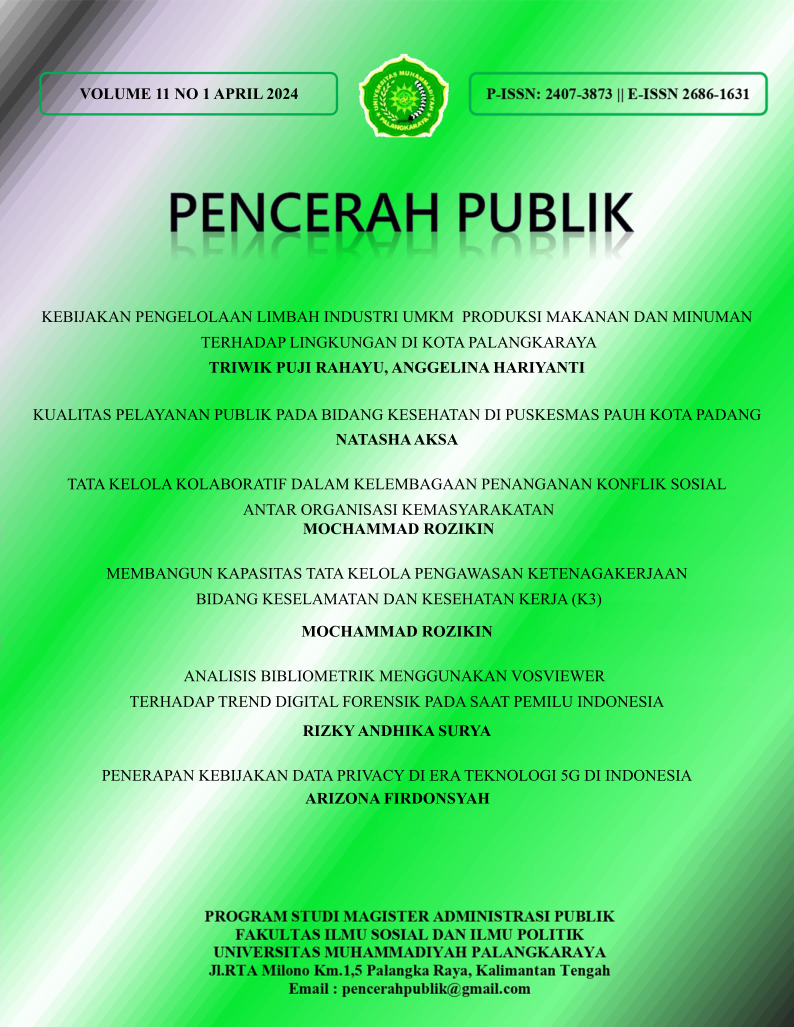Membangun Kapasitas Tata Kelola Pengawasan Ketenagakerjaan Bidang Keselamatan dan Kesehatan Kerja (K3) The Building Governance Capacity for Labor Inspection in Occupational Safety and Health (OSH)
Main Article Content
Abstract
The issue of implementing national K3 labor inspection includes two main aspects, namely governance and capacity building. The two main issues relate to weak awareness of the importance of implementing OSHMS in the workplace, weak understanding of K3 as part of human rights, weak criminal sanctions related to K3, relatively low coverage of K3 supervision, overlapping technical K3 regulations between institutions, weak quality, quantity and competence of K3, as well as the lack of synergy and integration of the operational supervision system between the central and regional governments. The author analyzes empirical data and reviews previous research using a systematic flow prism framework, and juxtaposes it with the fundamental theoretical concepts of governance, capacity building and labor inspection. The results of the analysis produce a hypothetical framework for building capacity for labor inspection governance in the K3 sector. This requires strategic intervention in human resource capacity, organizations and institutions, as well as governance that needs to be jointly constructed on the basis of an agreement on the principle of joint involvement. So, during the management and implementation process, each stakeholder/actor can be adaptive, the system and implementation of supervision can be more effective and efficient, where continuity and feedback from the accumulated process can reduce the impact and influence of uncertainty and the dynamics of a dynamic workforce environment.
Downloads
Article Details

This work is licensed under a Creative Commons Attribution-ShareAlike 4.0 International License.
Authors who publish with this journal agree to the following terms:
- Any article on the copyright is retained by the author(s).
- Author grant the journal, right of first publication with the work simultaneously licensed under a Creative Commons Attribution License that allows others to share work with acknowledgment of the work authors and initial publications in this journal.
- Authors are able to enter into a separate, additional contractual arrangements for non-exclusive distribution of published articles of work (eg, post-institutional repository) or publish it in a book, with acknowledgment of its initial publication in this journal.
- Authors are permitted and encouraged to post their work online (e.g., in institutional repositories or on their websites) prior to and during the submission process, as can lead to productive exchanges, as well as earlier and greater citation of published work.
- The article and any associated published material is distributed under the Creative Commons Attribution-ShareAlike 4.0 International License
References
Ayub, M., et.al.. (2021). Penyebab Terjadinya Pemogokan Kerja. Jurnal Pemikiran dan Penelitian Ilmu-Ilmu Sosial, Hukum, & Pengajarnya, 94-99.
BPS (Badan Pusat Satistik Indonesia), (2024). Data Statistik Nasional. Akses : https://www.google.com/url? sa=t&source=web&rct= j&opi=89978449&url =https:// www.bps.go.id/&ved=2ahUK Ewja8tjI- KaHAxU28Tg GHQM4AkQQ FnoECAg QAQ&usg= AOvVaw 20NZ QRSzeh4 P0FCurk MZYY.
Buyanaya, H. (2020). Pengawasan Ketenegakerjaan dan Prinsip Good Governance. Jurnal Proyuris, 142-156.
Djunaidi, D., & Alfitri, A. (2021). Dilema Industri Padat Modal dan Tuntutan Tenaga Kerja Lokal . Jurnal Penelitian Pendidikan Indonesia, 29-40.
Dungga, W. A., & Tome, A. H. (2019). Identifikasi Faktor Penghambat Penyelenggaraan Pengawasan Ketenagakerjaan di Provinsi Gorontalo. Jambura Law Review, 1-21.
Emerson, K., & Gerlak, A. K. (2014). Adaptation in Collaborative Governance Regimes. Environment Management, 768-781.
Grindle, M. S. (2001). Good Enough Governance (Revisited). Harvard University: A Report for DFID with reference to the Governance Target Strategy Paper, 2001.
Grindle, M. S., & Hilderbrand, M. E. (1995). Building Sustainable Capacity in The Public Sector: What Can Be Done? Public Administration & Development, 441.
Kemenaker RI. (2022). Profil Keselamatan dan Kesehatan Kerja Nasional Indonesia Tahun 2022. Jakarta: Direktorat Jenderal Pembinaan Pengawasan Ketanagakerjaan dan Keselamatan dan Kesehatan Kerja - Kementerian Ketenagakerjaan RI.
Lala, A. (2018). Pengawasan Kesehatan Tenaga Kerja Menurut PP Nomor 55 Tahun 2012 Tentang Penerapan SMK3. Syntax Literate : Jurnal Ilmiah Indonesia, 1-12.
Maulani, R. S., & Yeni Widyastuti, M. R. (2018). Pengawasan Ketenagakerjaan di Wilayah Serang I dalam Pemenuhan Hak Atas Pekerjaan bagi Penyandang Disabilitas di Kabupaten Serang. Prosiding Seminar Nasional Prodi Ilmu Pemerintahan UNTIRTA, pp. 173-186.
Mukhlis, M., et.al.. (2021). Law Terhadap Dinamika Kebijakan Penyelenggaraan Ketenagakerjaan Di Daerah. PROSIDING SNaIL 2021 SEMINAR NASIONAL ILMU LINGKUNGAN Tata Kelola Lingkungan untuk Mendukung Pembangunan Berkelanjutan (pp. 88-102). Bandar Lampung: UNILA.
Pratama, R. A., B. P., et.al.. (2019). Injustice During Night Work For Female Employees: A Lesson From Samarinda, Indonesia [Ketidakadilan Saat Bekerja Pada Malam Hari Bagi Pekerja Perempuan: Suatu Pelajaran Dari Samarinda, Indonesia]. Indonesian Journal of Law and Ecomonics Review, 32-38.
Richthofen, V. W. (2002). Labour inspection: A Guide to The Profession. London: International Labour Organization.
Suhardi, et.al.. (2020). Dinamika Permasalahan Ketenagakerjaan dan Pengangguran di Indonesia . Jurnal Bina Bangsa Ekonomika, 85-94.
Tumangkar, T. (2020). Pengawasan Ketenagakerjaan di Bidang Kesejahteraan. Jurnal Hukum dan Dinamika Masyarakat, 70-81.
Verawaty, et.al.. (2020). Peran Dinas Tenaga Kerja dan Transmigrasi Kepuauan Riau Dalam Melakukan Pengawasan Keselamatan dan Kesehatan Kerja (K3). Jurnal Magister Hukum Udayana, 859-871.
